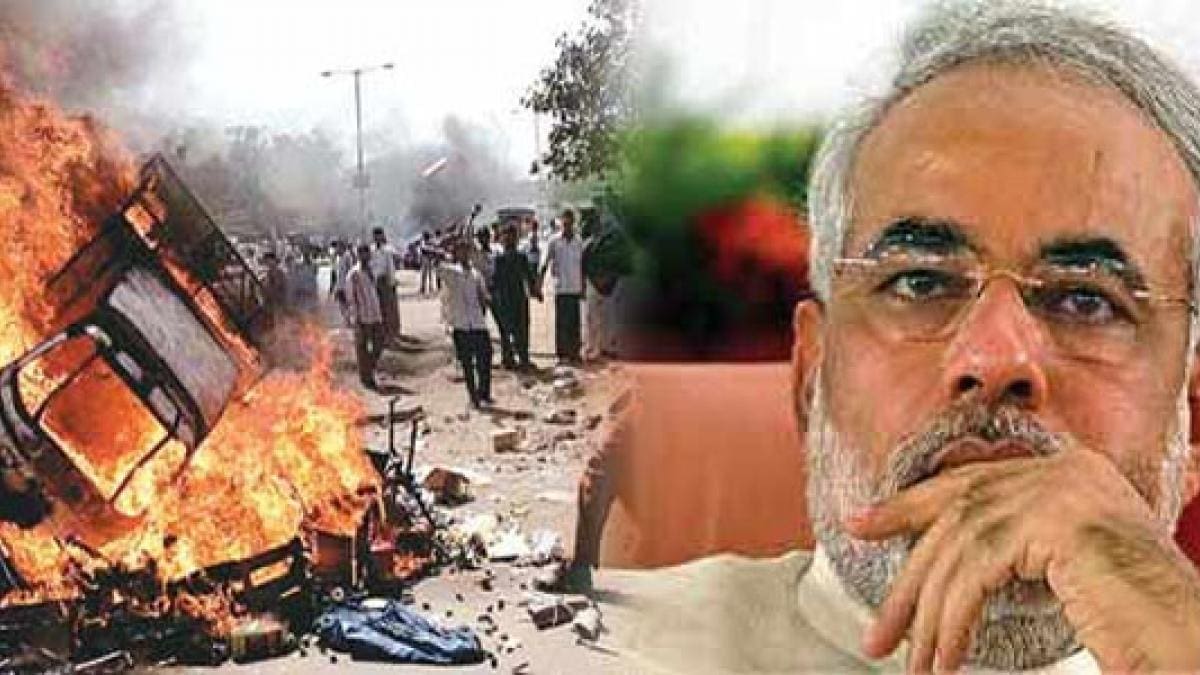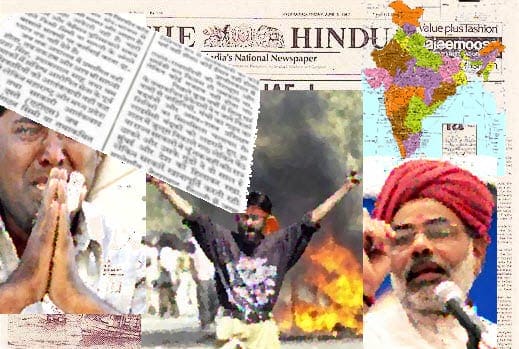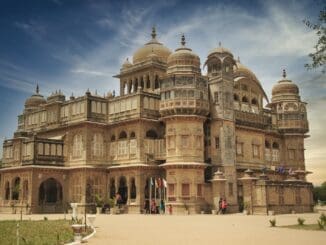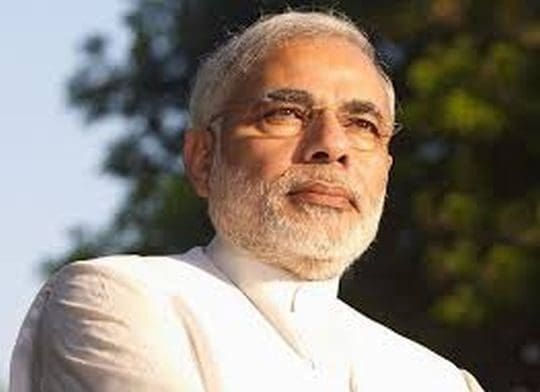
Tehelka: In other words, the way [you] have killed will go down in history.Bajrangi: Arrey hamari FIR me likha gaya hai… ek woh pregnant thi, usko to humne chir diya thha b*******d sala… Unko dikhaya ki kya hota hai… ki hum log ko tumne maara to hum tumko kya pratikaar de sakte hain… hum khichdi kadhi wale nahin hai [It has been written in my FIR… there was this pregnant woman, I slit her open, sisterf****r… Showed them what’s what… what kind of revenge we can take if our people are killed… I am no feeble rice-eater]… didn’t spare anyone… they shouldn’t even be allowed to breed… I say that even today…
Whoever they are, women, children, whoever… Nothing to be done with them but cut them down. Thrash them, slash them, burn the bastards… Hindus can be bad… Hindus can be bad, and I’m saying that because, as I see it, Hindus are as wicked as those people are… Many of them wasted time looting… Arrey, [the idea is] don’t keep them alive at all, after that everything is ours…(From Tehelka’s article- After Killing Them, I Felt Like Maharana Pratap )
The above revelation, made by Babu Bajrangi, a member of the Hindu nationalist organization, the ‘Bajrang Dal’ to a reporter of the weekly ‘Tehelka’, during a sting operation, shows the depths to which human beings can fall when seized by bigotry and hatred. Bigotry and hatred, these are emotions that Narendra Damodardas Modi personifies.
The Special investigation team mandated by the supreme court to investigate ten riot cases in Gujarat recently claimed before a court in Gujarat that there was no prosecutable evidence that could hold Modi responsible for the ghastly massacre at Gulbarg society, where among many others an ex congress MP(member of parliament) Ehsan Jafri was brutally murdered.
Based on the same report filed by the SIT, amicus curiae Raju Ramachandran recommended prosecuting Modi under Sections 153A, 153B, 166, and 505 of the Indian Penal Code. SIT‘s conclusion was hardly surprising to those following the case as though headed by an ex-CBI (Central Bureau of Investigation), the arms and legs of the team were made up of officials from Gujarat police. Admittedly, SIT‘s stand has made Modi’s indictment very difficult, but till the courts pass their judgment, to say that Modi has been legally exonerated would be wrong.
Unfortunately, the nature of the events makes it very difficult to pin Modi down legally. What can the courts do when every aspect of the state’s machinery whose duty is to protect people and apprehend criminals is subverted? Those in the know have long talked of the infamous meeting on 27 February 2002 at Modi’s residence where he allegedly asked his administration to look the other way and let the ‘Hindus have their revenge.
Two important witnesses, Haren Pandya(a minister during the riots) and Sanjiv Bhatt(the Deputy Commissioner of Intelligence, State Intelligence bureau during the riots) have corroborated this fact before an independent citizen’s tribunal and the SIT. While Haren Pandya was murdered under mysterious circumstances (rather fortunately for Modi), Sanjiv Bhatt‘s testimony was rejected by the SIT and in a brazen, vengeful attempt to discredit him, he was put behind bars under clearly false charges.
The presence in the police control rooms during the riots of two ministers from Modi’s cabinet also raises eyebrows.

Outside the courts, Modi has fought a fierce battle of public perception. Immediately after the Godhra massacre, the Gujarat government tried to make up a false narrative that claimed that the incident was a result of a conspiracy by Pakistan-backed terrorists.
After the post-Godhra riots in an ostentatious show of arrogance, he launched a ‘Gaurav Yatra’ to position himself as the champion of Gujarati pride. While those affected by the riots were still putting whatever was left of their lives together in refugee camps, Modi decided to crack a cruel joke and celebrate Gujarati pride!!
Between October 2002 and November 2006, in trying to project a ‘tough on terrorism’ stand, the Gujarat administration has been accused of carrying out 21 ‘extra judicial’ encounter killings including those of Sohrabuddin Sheikh and Ishrat Jahan. Most of these were of ‘terrorists’, sent to kill Modi, said the police without a shred of verifiable evidence. Perhaps Modi’s biggest public relations coup has been to land on the cover of TIME magazine. This has been possible after a sustained public relations campaign projecting Modi as a “Vikas Purush”.

From 2000 to 2009, Modi’s Gujarat was placed fourth in attracting FDI(Foreign Direct Investment), it fell to sixth place in 2011. According to the Planning commission, Gujarat’s poverty reduction rate falls behind that of Bihar, UP, West Bengal, and Andhra Pradesh. The prevalence of malnutrition among children under five is 44% in Gujarat, a figure higher than UP’s.
Ian Kershaw, a British historian and an expert on Nazi Germany once said,
“the road to Auschwitz was built by hate, but paved with indifference”.
While Modi continues to elicit extreme opinions of support and opposition, most people seem to have forgotten the events of Gujarat 2002. ‘Why to rekindle such tragic memories now?’, is the common refrain. They are largely indifferent to his crimes and seem ready to forgive him. A battle needs to be waged against this tragic amnesia.
The ramifications of our response to Gujarat 2002 are not limited to Gujarat alone, they relate to the nature of our state, our citizenship, the very idea of India. Do we want to create a state where people in power decide who deserves justice and who doesn’t? Do we surrender the rights and security of our minorities to people driven by prejudice, hate, and bigotry?
Do we tell a section of our society that just because they do not conform to some arbitrary conventions, they are second-class citizens? People tend to label the entire Modi debate as ‘secularism vs communalism’. It is in fact simpler than that, it is opposition against visceral hate and injustice, the kind that insidiously gnaws away at a nation’s soul.
To make sure that Modi is held responsible for his misdeeds legally, politically, and morally, the battle of perceptions has to be won. For this the story of Gujarat 2002 needs to be etched eternally in public memory, if we are to arrive at justice and reconciliation, the first step needs to be acknowledgment.
This is a guest post by Sai Krishna. He is pursuing MBBS at Kasturba Medical College (KMC), Manipal. Sai Krishna is a self-confessed Politics and Current Affairs junkie and wannabe writer.




Considering the Gujarat’s history of communal disturbances(there were 245 documented instances of them between 1950-1995),NaMo has to appreciated for what he has done to prevent any further riots after 2002…It’s time to move on.No point in dredging up the past,be it in 2002 or since 7th century.Period.
thats like saying just because a murderer hasn’t committed any more murders he should be exonerated…….there is a reason why justice is important…
Ours is a democratic nation and there is a process for everything.If he is found guilty,law will take its own course;justice is not decided in kangaroo courts.
I am not suggesting any undemocratic means, the battle of perceptions is a legitimately democratic process…modi himself is engaged in it…why else would he need a public relations firm?(apco)
Have you ever wondered maybe that this APCO you’re mentioning is actually a congress manufactured red herring?
https://www.indiatoday.in/india/west/story/narendra-modi-gujarat-government-american-firm-97069-2012-03-25
I don’t know the facts behind this apco,but if he did hire it,I don’t see any wrong here.Being in a competitive era,one has to sell himself/herself to survive.
exactly so i don’t see any wrong in publicising his misdeeds…..which btw i limit to facts not lies like him
As I said earlier,only courts can decide if he is guilty or not,not you and me.
Facts?Can you corroborate them with enough evidence(one that can convince Indian judiciary)?If not,you you will fall in to the category of ‘Arundhati Roy’,whose views on Indian system need no introduction.
comparing me to arundhati roy is d biggest compliment anyone has paid me……thank u!!!! i am honoured!!!!…….can anyone legally implicate obama for killing thousands of innocent pakistanis thru drone attacks?!! most probably no…..d point i want to make is if d entire system is subverted…how can u hope for honest investigation? how can u hope d same policemen who carried out fake encounters at modi’s behest to collect evidence against him…..through the activism of the sc, at least there is a chance of justice however miniscule it may be…..but dat doesn’t mean we cannot make modi pay politically…….
Just a query! Where do you stand on the 1984 riots by the Congress government?
horrible and a blot of humanity…….
How can u call the claim of NDA’s shinning India(2004) bogus?
as i said in d article, the development of a society should only be measured thru d development of its poorest(for an analogy…a chemical reaction is only as fast as its slowest step) lets look at the global hunger index(measures the prevalence and intensity of hunger in a country)….from 1996 to 2011, thr were only 3 countries whose ghi WORSENED congo, burundi and india….i would hardly call development whn d most basic human need…..food cannot be guaranteed………
Then what about India’s governements of the past?
obviously dey have failed to but none of dem had d audacity to say dat india was sining…
*too
The writer has a delusional sense of fairness in writing this article. There are more speeches of Narendra Modi on Youtube than of any other Indian (& perhaps global)
politicians.
That so many in the media hate Narendra Modi & yet he is the most popular politician of India reflects on the media which is out of touch with the masses & panders to CONGress party that has “behind the scene influence” in most of these media. If indeed Narendra Modi leads India someday, he will unearth corruption of monumental proportions at the highest levels in political
dynasties and among media barons. That Narendra Modi is incorruptible only adds to their fears.
As for the permanent blot that some people wish to assign to Narendra Modi regarding Gujarat riots here are some facts –
1. More people have died in other riots than in the Gujarat riots and that too for lot less blatant instigations than in Gujarat where a planned attack / fire on a train burned 59 people alive.
2. More people were killed at the hands of police and military during Gujarat riots than
during any other riots in India since its independence. In the 1985 Anti-Sikh riots while 3500 Sikhs were butchered by Congress politicians and workers, yet not a single bullet was fired even in the air.
3. For the first time in the history of India, a commission was formed by a Chief Minister where in he assigned the judges recommended by the High Court of the state and the Supreme Court of India AND asked them to look in to failure, negligence or active instigation of riots by ministers INCLUDING the Chief Minister himself. While the first half of the report conclusively exposed the planned conspiracy of the attack on the train, the second report regarding the riots that followed & government’s response to it is expected to be out by early 2013.
4. Even the Special Investigation Team appointed and monitored by the Supreme Court
of India has apparently given a clean chit to the Chief minister but the report is not officially public yet.
Narendra Modi hasn’t expressed remorse as it implies guilt that not been proven in any court
of law or by any media. He has expressing regret many times that such riots happened on his clock despite the best efforts of his government.
He simply refuses to do so “on demand” by any & every journalist out to prove his “secular credentials” by worrying about the plight of 1200 victims of Gujarat riots while being shamelessly silent on the plight of thousands of Hindus uprooted from their own homes in Kashmir
and forced to live like refugees in their own country.
Obsession about Gujarat riots in Narendra Modi’s tenure is like judging the entire Clinton era based on Monica Lewinsky episode. Both are grossly exaggerated & highly biased means of judging each of these personalities.
a democratic victory is no moral exoneration…….murderers have been elected to public office before and continue to do so……..so ur theory about how modi’s popularity somehow gets him off d hook is ridiculous……as i said in d article this is not a secularism vs communalism debate, as are ones about anti sikh riots and d plight of kashmire pundits….interesting how d ‘vikas purush’ argument has suddenly disappeared…..atleast one bird has been slayed……’obsession’? i’ll take dat as long as i am obssessed wid justice i think i am on d right path…..its a shame u aren’t….
That’s the problem: “justice” in Gujarat’s 2002 communal conflagration has come to mean putting Modi in jail. Nobody, except Modi and probably a few top cops, know the real truth: we can’t know whether he actually told policemen to let Hindus vent their anger in retaliation for the Godhra train burning, or was merely unsuccessful in containing the communal rioting and killings that followed.
Nevertheless, we have now worked ourselves up to the point where only the incarceration of Modi will seem like justice – even if it kangaroo justice.
do u really think that without the connivance and active indifference of the state administration a massacre on such a scale would have been possible? i recognize that it may be impractical to incarcerate modi( though the legal process is far from over)….but he should at least pay politically…….for his sins…he deserves to be banished from political life……
*impractical to succeed in incarcerating him….
Why single out Modi then?
Shouldn’t it be the same for the Congress leaders for the 1984 riots?
For riots that took place in West Bengal? Why is Mamata not being asked the same questions for the Nandigram and Singur killings?
absolutely i agree wid u completely i neer said i didn’t……….mamta banerjee wasn’t cm at dat time btw…it was buddhadeb bhattacharjee..
I see no outrage from self-proclaimed seculars on this speech by junior Owaisi ‘Saab’ (Dunno how to address this guy.Since Barkha Dutt addresses senior owaisi as ‘saab’ ,i did the same) http://www.youtube.com/watch?v=L-d11toMXfw
i want u to read dis comment carefully since u have made it evident dat u do not understand whatever i have written till now……..i already said dat i do not consider this a secularism vs communism debate…….it is a simple argument vs injustice…….i don’t think i can make it any clearer……i do not rail against modi because i am secular(though i am a secular)…i do it because i have a moral conscience……u modiphiles need to come up wid better arguments…every time someone says something against modi u label dem ‘PSEUDO/SELF PROCLAIMED SECULARS’….every time some one puts up a fact indicting him u say it is made up by ‘pro-congress’ media….if u have a moral conscience(i hope u do) clear away ur prejudice and look at facts objectively……i only hope for ur sake u realize d truth….as for d video is concerned i just see a sick guy making sick comments….no way related to dis article….
*secularism vs communalism
You are bang on right.I didn’t read the article completely.Usually I don’t read articles on Modi when I see some keywords like tehelka,NDTV,Barkha Dutt etc…So far these ‘left’ media couldn’t produce any prosecutable evidence against Modi and I wonder if they can do it in future.
Coming to justice vs injustice,let’s come to them in Chronological order starting right from partition to Kashmir massacres to the recent Mumbai attacks.
This Owaisi saab is just a sick guy??Don’t you know about recent riots in Hyd?I see no outrage on this hate speech from pro-congress media,but every week they run a story on Modi defaming him.What do we call it?’Selective secularism’?
If u have not and do not want to read d article….den wid all due respect, u have no right to comment…once u have read d article and want to engage in a meaningful, sensible debate about d facts and opinions stated in d article…i’ll be ready…but i will not waste my time debating wilful ignorance…..
I’ve reading this stuff for the last 5 years in various media.Initially I too bought into these allegations,viewed Modi like you do,but once I got hold of facts through non-mainstream media,I got a feeling that it’s just a propaganda by vested interests(who were also present in bjp as well).From then on,I have never fully read articles defaming Modi.They have become a cliche without any value.And lastly,since you are Arundhati Roy fan,let me make it clear that I have full faith in Indian judiciary and its machinery.If someone is found guilty,law will take its own course.I don’t believe in lynching someone in kangaroo courts just because you perceive him to be criminal.
http://www.youtube.com/watch?v=c0ZvADtrDPM if u call this also “biased mainstream media” den i am afraid u need to check d meaning of d words in a dictionary………..
It’s too long.Will watch it later…But let me reiterate this one…What happened in 2002 was really unfortunate.It was not new to Gujarat which has seen 245 such incidents from 1950-1995.Modi is the one who had done away with them in the last decade,which is really appreciable.Instead of living in the past,it’s better to move on and support the best administrator in his endeavor to take the nation forward economically.
If u think riots in guarat were worst den in punjab i dnt think cats n dogs were killed,dey were sikhs
n d recent attack in ASSAM ,sowho is responsible for that
there have been more riots under congress ruled areas
so u CONGRESS supporters must watch that first